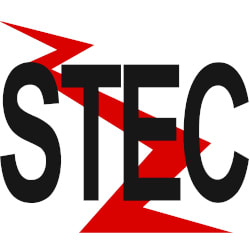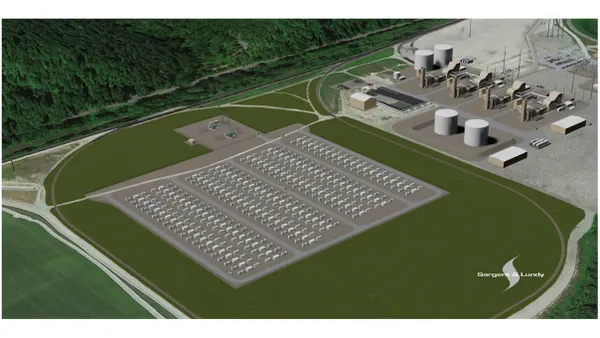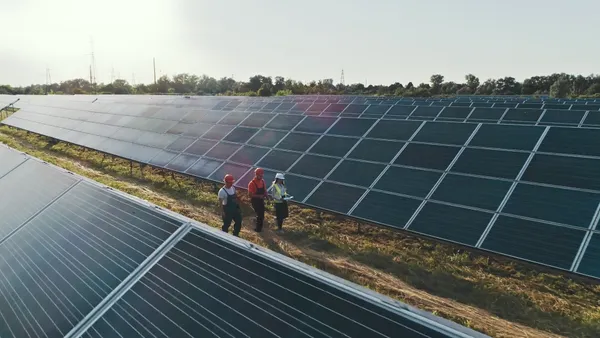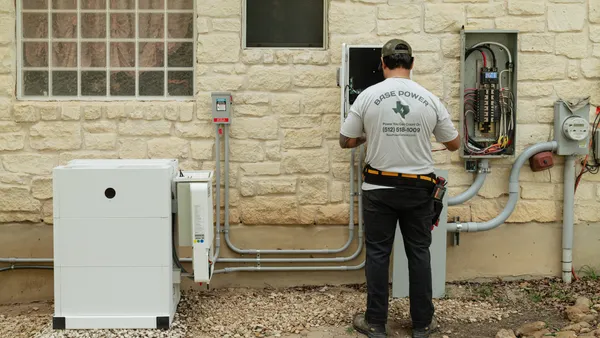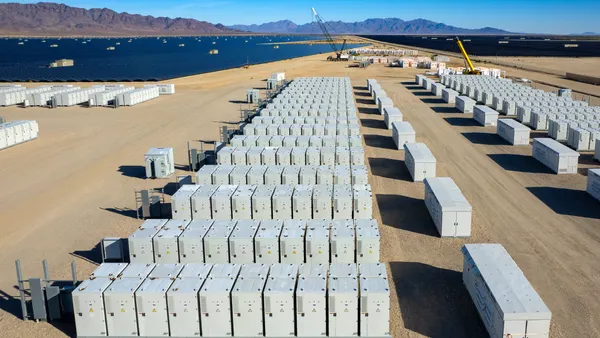UPDATE: May 18, 2021: The Hawaii Public Utilities Commission late last week issued an order modifying and eliminating some of the conditions it placed on its approval of Hawaiian Electric’s proposed power purchase agreement with the Kapolei storage project. Among other things, the order removed a condition requiring the utility to forgo certain performance incentives, and removed required deadlines for “financially” retiring a few fossil fuel generating units.
“The commission’s order addresses most of Hawaiian Electric’s concerns regarding conditions imposed by the PUC on the operation of the Kapolei Energy Storage project,” utility spokesperson Jim Kelly said in an emailed statement.
Dive Brief:
- Hawaiian Electric Co. (HECO) is urging state regulators to reconsider a series of conditions they placed on their approval of the agreement for its planned 185-MW battery storage project in Kapolei, Oahu, noting in a statement that the requirements make it "nearly impossible" for the project to move forward.
- The Kapolei project is an important part of HECO's plans to retire its AES coal plant on Oahu. But the utility highlighted worries that the Hawaii Public Utilities Commission's (PUC) conditions could deter the project as well as future renewables and storage developments, in a filing on Monday.
- "While technically an approval, the order imposes conditions that may prevent us and the developer from moving forward with this project," Constance Lau, president and CEO of HECO parent company Hawaiian Electric Industries, told analysts during an earnings call last week.
Dive Insight:
The commission placed nine conditions on its approval of HECO's power purchase agreement for the Kapolei storage project, including requiring it to forgo performance incentives and placing deadlines on the utility to financially retire fossil fuel plants. While the company said it could accept some of those conditions, at least four are "highly problematic," it argued in a motion for reconsideration it filed with the agency on Monday.
HECO warned in its motion that unless the PUC reconsiders, the decision "will also send a chilling message to future developers that will likely have a profound and highly detrimental impact on Hawaii's renewable energy and energy storage market for years to come."
The company is broadly concerned that the conditions would make developers wary of Hawaii's energy procurement processes, causing them to either invest instead in other areas of the country with more predictability or bake that process risk into their pricing.
The 185 MW/565 MWh Kapolei storage project is part of HECO's plan to replace its AES coal plant, which is scheduled to go offline in September 2022. The plant currently serves 15% of the demand on Oahu and is the first in a series of fossil fuel resources the utility is aiming to retire in the coming years. But regulators have their own concerns about the storage project, including that it will initially charge off primarily fossil fuels.
The foregone performance incentives could amount to up to $1.7 million, according to the utility. This condition both violates HECO's due process rights and also sends a “concerning message” about the predictability of Hawaii’s new performance-based regulation framework, the utility argued.
Another condition, which establishes minimum thresholds for the Kapolei storage project's use of renewables, would restrict HECO to only charging the battery at certain time periods, the utility said, reducing its economic and reliability benefits. The commission has ordered that the project meet a 50% renewable threshold in its first two years of operation, 75% between its second and fifth years, and 90% at five years and beyond.
If the commission chooses not to modify the decision to the extent HECO is asking for, it’s likely that the utility will appeal the matter in court, said Marco Mangelsdorf, responsible managing employee at ProVision Solar. If that were to happen, it's possible the Kapolei project may be delayed beyond the retirement of the AES coal plant, or the developer of the project might pull out, he added.
"In the worst case, it means the tight reserve margin is so tight that there could be… power outages across the Hawaiian Electric service territory," Mangelsdorf explained.
If the project is canceled, the state will need to put the "pedal to the metal" to get alternative resources operational, he added, like demand response efforts or "putting in motion some type of massive deployment of behind-the-meter storage, which takes time."
"Depending on what the decision says and the timing, we'd look at our options, including an appeal in court," Hawaiian Electric spokesperson Jim Kelly said in an email, when asked what the utility's next steps would be if the decision is not modified as it requested.
Kylie Wager Cruz, staff attorney with Earthjustice, said in an email that it is disappointing that the utility is setting up a zero-sum game of "our way or nothing."
"HECO should take responsibility for the crisis it's caused and focus on ensuring [the project] realizes its full potential to maximize renewable energy on the grid and minimize Hawai'i's dependence on fossil fuels. Instead, HECO's threatening to pull the plug on the project, put all the risk on ratepayers and the grid, and make us pay for all of it either way," she said.









